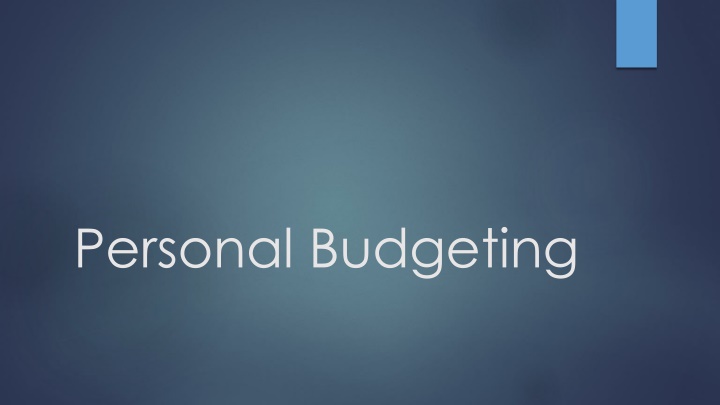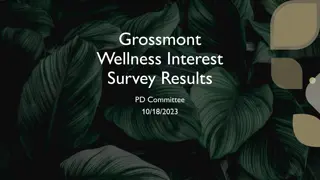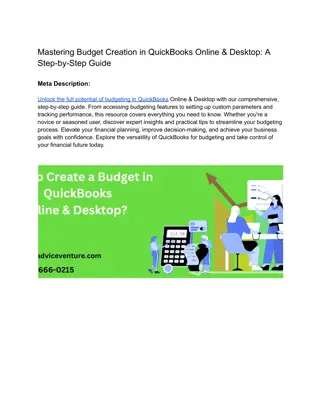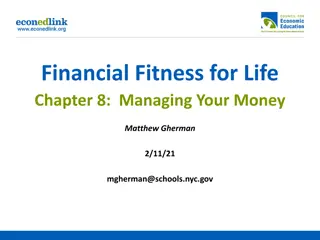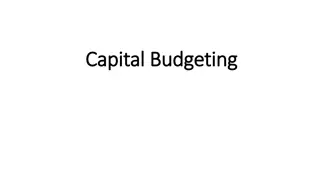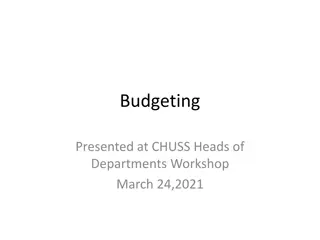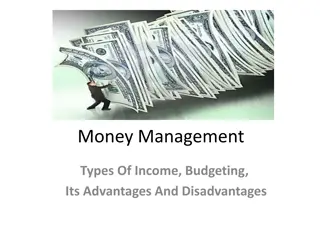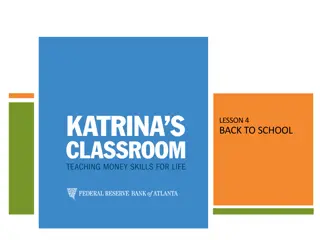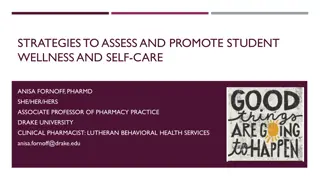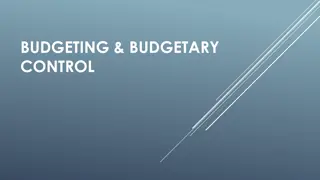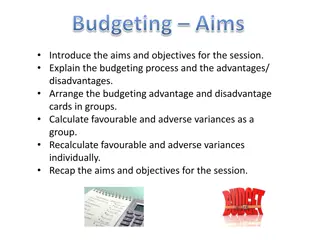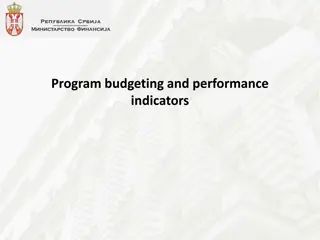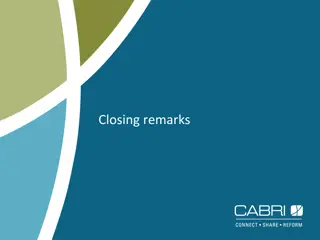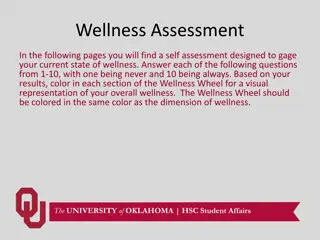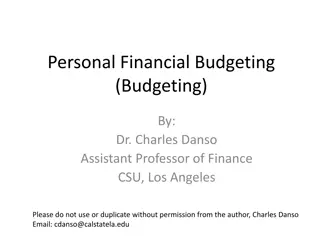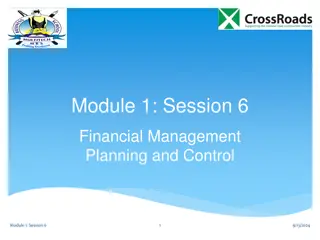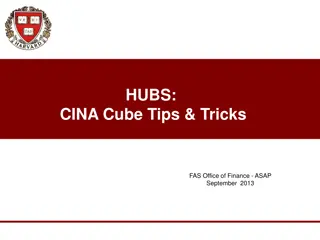Mastering Personal Budgeting: A Guide to Financial Wellness
Take control of your finances through budgeting to understand your spending, pay off debts, and plan for the future. Budgeting promotes good habits, reduces financial anxiety, and helps achieve short and long-term goals at every stage of life. Learn to differentiate needs from wants, manage fixed and variable expenses, and develop a sustainable financial plan for a secure future.
Download Presentation

Please find below an Image/Link to download the presentation.
The content on the website is provided AS IS for your information and personal use only. It may not be sold, licensed, or shared on other websites without obtaining consent from the author.If you encounter any issues during the download, it is possible that the publisher has removed the file from their server.
You are allowed to download the files provided on this website for personal or commercial use, subject to the condition that they are used lawfully. All files are the property of their respective owners.
The content on the website is provided AS IS for your information and personal use only. It may not be sold, licensed, or shared on other websites without obtaining consent from the author.
E N D
Presentation Transcript
Have you ever said to yourself Where does all of my money go? Budgeting will allow you to know where your hard earned money goes. When will I be able to pay off my loans? Budgeting is a first step in making future financial plans. How am I going to be able to afford ______? Budgeting helps you limit unnecessary spending so that you can afford things you need. Thinking about money makes me nervous! Budgeting helps limit financial anxiety. I m not a math person. I can t figure out how to budget! Budgeting only requires simple +, -, x, and , but mostly just + and -. I m afraid to know how much I spend on ______! Budgeting gives you permission to only spend up to a certain amount. My spending is out of control! Budgeting helps promote good habits.
Budgeting = Habit Formation Habit that takes the guesswork out of financial decisions in each stage of life Meet expenses and limit/avoid debt as a student. Prepare for marriage, children, and homeownership as a young adult. Save for retirement and generosity in older adulthood. Live as a retiree without being a financial burden on family or the government. Setting up systems and using tools to help you meet both short-term and long- term goals Set monthly and annual goals (in conjunction with spouse if applicable). Track expenses throughout month using a spreadsheet or app. Review monthly and annually to see if you ve met goals and how you can improve. Paying with cash, avoiding unnecessary debt Being prepared for the unexpected, because the unexpected will happen! Learning to be content with your life
Money coming in Money going out Make a list of everything that you spend money on and break it into categories. Does your income stay the same or does it vary from paycheck to paycheck? If it varies, decide on a very conservative estimate of what you will likely earn during a period of time. Analyze each category based on two questions: Is it a need or a want? Is the amount I spend on this category the same every month or does it vary? Focus on your take home pay (i.e., what you get to keep after taxes, union dues, benefit payments, etc. are withheld by your employer), not gross pay. Especially important if self-employed or a business owner since you are responsible for tax payments throughout the year in some cases.
Expenses: Need or want? Needs receive top priority. The first things that should be considered in your budget Examine wants to see if you actually need them. Practice postponing buying wants as a lot of the time you will realize you are just fine without them. Think about other costs beyond purchase price associated with wants. Upkeep cost Complementary purchase costs Opportunity costs
Expenses: Fixed or Variable? Fixed expenses remain the same for a period of time, typically month to month. Fixed expenses are often contract based. Shop for better prices when the contract is about to expire. Variable expenses change based on some factor, typically usage. Find a way to treat variable expenses as if they were fixed expenses (e.g., I will not spend more than $__ on vehicle fuel this month).
Income Category Examples Keep track for each individual income source. Gross income Withheld* taxes and fees (*typically) Federal, state, local income taxes Social security and Medicare Union dues (if applicable) Employer sponsored benefits (e.g., medical, vision, dental, retirement, disability) Take-home pay Remember: Take-home pay serves as the foundation for your budget!
Expense Category Examples Shelter Food Rent/Mortgage Groceries Water Regular Eating Out Electric Special Eating Out Gas Trash Clothing Rental/Homeowner s Insurance Clothes Property Taxes Shoes Furniture/Decoration Allowance Maintenance/Tools/Cleaning Supplies
Expense Category Examples Transportation Health Insurance premiums Insurance premiums (if not withheld by employer) Fuel Rx/OTC medicines, vitamins Tires/brakes Office visits Car wash Testing Tolls Health/Beauty/First Aid Supplies Oil change and tire rotation Dental Minor car maintenance/parts Vision Registration Renewal Fitness Equipment/Gym Fees State Inspection Haircuts Taxes Parking (non-entertainment related) Uber/Lyft/Taxi fees
Expense Category Examples Entertainment School Tuition and fees Loan payments (if applicable) Books Tickets, concessions, parking Cell phone Internet access Streaming services and/or cable Pocket money for impulse buys Technology (e.g., computer) Conferences, professional development, etc. Investment Emergency Fund for unexpected expenses Retirement/IRA Giving Family and friend gifts and cards (e.g., birthday and holidays) Special occasion gifts (e.g., wedding, baby) Life insurance (if applicable) Religious and/or charitable giving Giving to help family and friends in need
Expense Category Examples Other/Misc. Travel Tax preparation Entertainment (tickets, admissions, etc.) Stamps/postage Vehicle Fuel, Uber/Lyft/Taxi fees Taxes not withheld by employer (e.g., estimated taxes, use tax, certain local taxes) Flights Rental Car Non-categorizable expenses Eating Out Lodging Tolls Parking Misc. travel expenses
Expense Category Budgeting Tips School Food Find ways to limit costs (e.g., be an RA, do work study, hunt for scholarships, become a graduate assistant) and avoid debt. Do not be swayed by the brand of the school, focus on cost. Find an employer that offers tuition reimbursement. Giving Eat in as much as possible, but if you do eat out save by getting water instead of soft drinks (or alcohol). Clothing Focus on buying interchangeable staple clothing and footwear items that are timeless and will last as opposed to being trendy. Shelter Find a way to be generous with your money, even if just a little. Entertainment Live at home or get a roommate (or two or three) so that you can share expenses. Avoid spending more than 25% of take-home pay on shelter. Health Prioritize what you enjoy most; eliminate or limit the rest. How many streaming services do you actually need? Investment Find a way to get insurance. Engage in healthy activities now (e.g., eating, exercise) to save on your health bills later in life. Transportation Start now, even if small. Look into an IRA. Travel Find ways to share costs with family/friends. Take shorter trips within driving distance as opposed to paying to fly somewhere. Stay at budget hotels. Do not be swayed by Instagram or others. Buy a newer used car as opposed to a brand new one. Only buy what you can afford in cash since vehicles only go down in value.
Dave Ramseys Baby Step Method Once you ve mastered budgeting in the short- term, you can start to think about the long-term. While the later steps might not apply to you for a few years, they will be easier to achieve in the future if you master budgeting now. Save $1,000 for your starter emergency fund. Pay off all debt (except your house) by paying off debts from smallest to largest (i.e., the debt snowball). Save 3-6 months of expenses in a fully funded emergency fund. Invest 15% of your household income in retirement. Save for your children s college fund. Pay off your home early. Build wealth and give. 1. 2. 3. 4. 5. Source: The Total Money Makeover by Dave Ramsey, Daveramsey.com, and/or The Dave Ramsey Show Podcast 6. 7.
Resources WLU s FIN 131: Financial Literacy course (available as a general studies course for most majors) Daveramsey.com (and all other Dave Ramsey resources) NerdWallet.com Debt.org Microsoft Excel (build your own budget or use a template) Building your own budget in a spreadsheet gives you the most control Your online bank account (if you prefer a debit card to carrying cash) might have a budgeting tool Google search budgeting for college students
